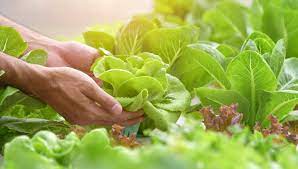The Benefits of Eco-Friendly Farming
As the global population continues to grow, the importance of sustainable and eco-friendly farming practices becomes increasingly evident. Eco-friendly farming, also known as sustainable agriculture, focuses on reducing environmental impact while maintaining productivity and profitability. Here are some key benefits of eco-friendly farming:
Preservation of Natural Resources
Eco-friendly farming aims to conserve natural resources such as water, soil, and biodiversity. By using techniques like crop rotation, cover cropping, and integrated pest management, farmers can maintain soil fertility, reduce erosion, and protect local ecosystems.
Reduced Chemical Usage
Unlike conventional farming methods that rely heavily on synthetic pesticides and fertilisers, eco-friendly farming promotes the use of organic inputs and biological controls. This not only minimises chemical residues in food products but also helps prevent water pollution and protects beneficial insects.
Climate Change Mitigation
Eco-friendly farming practices contribute to mitigating climate change by reducing greenhouse gas emissions and promoting carbon sequestration in soils. Techniques such as agroforestry, conservation tillage, and organic farming help farmers adapt to changing climatic conditions while reducing their overall carbon footprint.
Improved Food Quality
Foods produced through eco-friendly farming methods are often perceived as healthier and more nutritious due to their lower chemical content and higher nutrient levels. Consumers increasingly value products that are grown sustainably without compromising taste or quality.
Economic Resilience
Eco-friendly farming can enhance the economic resilience of farmers by reducing input costs over the long term and improving market access for sustainably produced goods. By adopting environmentally friendly practices, farmers can create value-added products that appeal to conscious consumers.
In conclusion, eco-friendly farming offers a holistic approach to agriculture that benefits both the environment and society as a whole. By prioritising sustainability and resource efficiency, farmers can create a more resilient food system that meets the needs of present and future generations.
Understanding Eco-Friendly Farming: Common Questions and Practices
- Which is the most environmentally friendly agriculture?
- What is an eco farm?
- How to make a farm eco-friendly?
- What is the practice of eco friendly agriculture?
- How eco friendly is farming?
Which is the most environmentally friendly agriculture?
When considering environmentally friendly agriculture practices, organic farming often emerges as one of the most sustainable options. Organic farming avoids the use of synthetic pesticides and fertilisers, prioritising natural methods to maintain soil health and biodiversity. By promoting crop rotation, composting, and biological pest control, organic agriculture reduces chemical inputs and minimises environmental impact. Additionally, organic farming contributes to carbon sequestration in soils and supports wildlife conservation, making it a popular choice for those seeking eco-friendly agricultural solutions.
What is an eco farm?
An eco farm, short for ecological farm, is a type of agricultural operation that prioritises sustainability, environmental stewardship, and biodiversity conservation. Eco farms strive to minimise their impact on the environment by employing practices such as organic farming methods, crop rotation, composting, and water conservation techniques. These farms often focus on enhancing soil health, promoting natural pest control, and reducing reliance on synthetic inputs like pesticides and fertilisers. By adopting eco-friendly principles, eco farms aim to create a harmonious balance between agricultural production and the preservation of natural resources for future generations.
How to make a farm eco-friendly?
To make a farm eco-friendly, several key practices can be implemented. Firstly, adopting organic farming methods and reducing the use of synthetic pesticides and fertilisers can significantly reduce environmental impact. Implementing sustainable water management techniques such as rainwater harvesting and drip irrigation helps conserve water resources. Additionally, promoting biodiversity through crop rotation, intercropping, and planting native species can enhance ecosystem resilience. Utilising renewable energy sources like solar panels and wind turbines can also reduce the farm’s carbon footprint. Overall, a combination of these practices can help make a farm more eco-friendly and sustainable for the long term.
What is the practice of eco friendly agriculture?
The practice of eco-friendly agriculture, also known as sustainable farming, involves implementing techniques and methods that minimise environmental impact while promoting long-term sustainability. This approach focuses on preserving natural resources, reducing chemical inputs, and mitigating climate change through practices such as crop rotation, organic farming, and integrated pest management. By prioritising soil health, biodiversity conservation, and resource efficiency, eco-friendly agriculture aims to create a balanced ecosystem that supports both agricultural productivity and environmental stewardship.
How eco friendly is farming?
Farming plays a crucial role in our ecosystem, and the extent to which it can be considered eco-friendly depends on the practices employed. Eco-friendly farming encompasses a range of sustainable techniques aimed at minimising environmental impact while maintaining productivity. By adopting methods such as organic farming, crop rotation, and agroforestry, farmers can reduce reliance on synthetic chemicals, conserve natural resources, and promote biodiversity. While challenges exist in transitioning entire agricultural systems to fully eco-friendly practices, ongoing efforts and innovations continue to improve the sustainability of farming operations worldwide.

